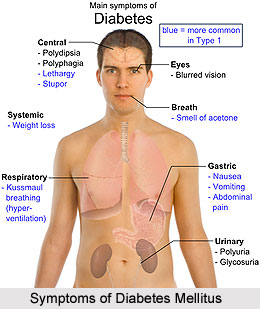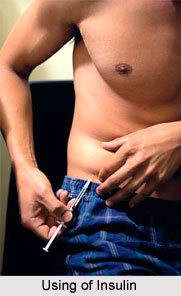 The common disorder in the carbohydrate metabolism of human beings, Diabetes Mellitus or Madhumeha, can be detected through various signs and symptoms. However, there are a few common symptoms that can be found in almost all types of diabetes. The severity of the disease can be determined by studying these symptoms. The symptoms of diabetes help a lot in an early detection of the disease and they also help in choosing the right treatment method for curing diabetes.
The common disorder in the carbohydrate metabolism of human beings, Diabetes Mellitus or Madhumeha, can be detected through various signs and symptoms. However, there are a few common symptoms that can be found in almost all types of diabetes. The severity of the disease can be determined by studying these symptoms. The symptoms of diabetes help a lot in an early detection of the disease and they also help in choosing the right treatment method for curing diabetes.
The three most common symptoms for Diabetes Mellitus or Madhumeha are polyuria, polydipsia and polyphagia. They are frequent urination, increased thirst and consequent increased fluid intake and increased appetite. The main reason behind these three symptoms is the excess glucose circulating through one`s body that draws water from the tissues. This makes the person feel dehydrated and to quench thirst, the person drinks a lot of water and other beverages. Drinking water and other beverages further lead to more frequent urination. The symptoms of diabetes may develop all of a sudden or gradually and some people may not have any symptoms at all. The symptoms develop slowly particularly in case of Type 2 Diabetes. It is found that many people have the Type 2 Diabetes for as long as eight years before the disease is diagnosed.
The patients of Diabetes Mellitus or Madhumeha may sometimes have flu-like symptoms. People sometimes mistook diabetes to be viral illness, as the symptoms like fatigue, weakness and loss of appetite are common in both diseases. Sugar is considered the body`s main fuel and when it fails to reach the cells, a person may feel tired and weak. Another symptom of diabetes is weight gain or weight loss. A diabetic person can gain weight for overeating, as the body always tries to compensate for lost fluids and sugar. However, the opposite can also occur and in spite of eating more than normal, one can lose weight, as the muscle tissues do not get enough glucose to generate growth and energy. Weight gain or weight loss is commonly found in case of Type 1 Diabetes, where very little sugar gets into the cells. In fact, most people with type 1 diabetes are found to be at or below their normal weight.
Sometimes people suffering from Diabetes Mellitus or Madhumeha may have symptoms of blurred vision. This is because high levels of blood sugar pull fluid out of the tissues in the body, including the lenses of eyes. This affects the person`s ability to focus. However, the vision of the person may improve once diabetes is treated and the blood sugar levels drop. However, diabetes can also cause new blood vessels to form in the retina and damage old vessels. Though this causes only mild vision problems in most people, the effects may be more serious in others. Diabetes can lead to blindness in rare cases as well. The diabetic people sometimes have frequent infections and their sores heal slowly. Fungal or bacterial skin infections or UTI (urinary tract infection) are found quite commonly among diabetic people. Most of the times, diabetes affects the body`s ability to heal and fight infection. The wound healing process becomes slow, as high blood sugar resists the flourishing of WBC (white blood cell), which are responsible for body immune system. When these cells do not function accordingly, the wound healing process becomes quite slow.
 One of the common symptoms of Diabetes Mellitus or Madhumeha is nerve damage or neuropathy. Generally, excess sugar in blood can damage the small blood vessels to the nerves and lead to a number of symptoms. The most common among these symptoms are tingling and loss of sensation in the hands and especially in the feet. A diabetic person may also experience burning pain in his legs, feet, arms and hands. Some diabetic people may have red, swollen and tender gums. Diabetes can increase the risk of infection in one`s gums and in the bones that hold the teeth in place. As a result, the person`s teeth may become loose or the person may develop sores or pockets of pus in his gums as well.
One of the common symptoms of Diabetes Mellitus or Madhumeha is nerve damage or neuropathy. Generally, excess sugar in blood can damage the small blood vessels to the nerves and lead to a number of symptoms. The most common among these symptoms are tingling and loss of sensation in the hands and especially in the feet. A diabetic person may also experience burning pain in his legs, feet, arms and hands. Some diabetic people may have red, swollen and tender gums. Diabetes can increase the risk of infection in one`s gums and in the bones that hold the teeth in place. As a result, the person`s teeth may become loose or the person may develop sores or pockets of pus in his gums as well.
Increased fatigue is considered one of the major symptoms of Diabetes Mellitus or Madhumeha. This symptom is seen mainly due to inefficiency of the cell to metabolise glucose, which causes the reserve fat of body to be metabolised to gain energy. The body uses more energy as compared to glucose when fat is broken down in the body. As a result, the body goes in negative calorie effect that eventually results in fatigue. Another common symptom of diabetes is irritability. This is actually a sign of high blood sugar caused due to the inefficient glucose supply to the brain and other body organs. This results in fatigue and feelings of uneasiness.
Apart from the above mentioned signs and symptoms of Diabetes Mellitus or Madhumeha, there are also a few other symptoms that can be seen in diabetic people. These symptoms include dehydration, mental fatigue, nausea, vomiting, abdominal pain, pain in the limbs, certain inflammatory chest diseases, etc. Most of the symptoms of diabetes are seen when the disease is already there in the body. However, taking preventive actions like following dietary restrictions and making a few lifestyle changes can help in staying away from diabetes.




















